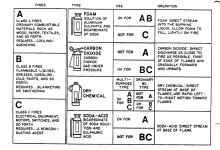LoboGunLeather
US Veteran
For many years I have always kept a fire extinguisher handy in the kitchen and I also have one mounted in my garage. I always check these for proper charging and overall condition several times each year, usually every time I change the furnace filters, but I have never actually needed to discharge one or even point one at a flame or smoldering pile of rubbish.
Lately I have been having second thoughts. I have never had any professional training in handling fire extinguishers. I have worried about possible injuries that could be caused by some of the chemicals used in fire extinguishers. The locations of my fire extinguishers are easily accessible to anyone in the home, including children, and I wonder at times if I should either keep them under lock and key or just get rid of them.
There is a fire station only about a mile from my home, and the city fire department is a professional full-time organization.
For those of us who are not trained professional fire fighters is there really any reason to have fire extinguishers in our homes? Wouldn't we be better off to call the fire department and let the professionals deal with dangerous situations? Should retailers, or internet dealers, be allowed to sell fire extinguishers to anyone without proof of training or proficiency, no licensing or permit requirements, not even a waiting period?
For clarification, neither of my fire extinguishers are automatic or even semi-automatic. One is a 2-lb. capacity, but the other is a 5-lb., and that might make one of them a large-capacity fire extinguisher (even though there are bigger ones out there, and mine was manufactured specifically for that capacity). Mine are both equipped with manual safety devices, little pins with rings that even a child could disengage easily. Either one is capable of completely discharging its entire charge with a single squeeze of the trigger-like mechanism; as long as you hold the lever down it will keep on shooting those chemicals out, and it is possible to spray down a pretty large area before running out.
Perhaps it is time for an open and honest debate on this serious public safety issue.
Lately I have been having second thoughts. I have never had any professional training in handling fire extinguishers. I have worried about possible injuries that could be caused by some of the chemicals used in fire extinguishers. The locations of my fire extinguishers are easily accessible to anyone in the home, including children, and I wonder at times if I should either keep them under lock and key or just get rid of them.
There is a fire station only about a mile from my home, and the city fire department is a professional full-time organization.
For those of us who are not trained professional fire fighters is there really any reason to have fire extinguishers in our homes? Wouldn't we be better off to call the fire department and let the professionals deal with dangerous situations? Should retailers, or internet dealers, be allowed to sell fire extinguishers to anyone without proof of training or proficiency, no licensing or permit requirements, not even a waiting period?
For clarification, neither of my fire extinguishers are automatic or even semi-automatic. One is a 2-lb. capacity, but the other is a 5-lb., and that might make one of them a large-capacity fire extinguisher (even though there are bigger ones out there, and mine was manufactured specifically for that capacity). Mine are both equipped with manual safety devices, little pins with rings that even a child could disengage easily. Either one is capable of completely discharging its entire charge with a single squeeze of the trigger-like mechanism; as long as you hold the lever down it will keep on shooting those chemicals out, and it is possible to spray down a pretty large area before running out.
Perhaps it is time for an open and honest debate on this serious public safety issue.


